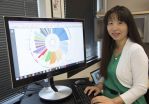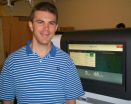(Press-News.org) At least 2 percent of people over age 40 and 5 percent of people over 70 have mutations linked to leukemia and lymphoma in their blood cells, according to new research at Washington University School of Medicine in St. Louis.
Mutations in the body's cells randomly accumulate as part of the aging process, and most are harmless. For some people, genetic changes in blood cells can develop in genes that play roles in initiating leukemia and lymphoma even though such people don't have the blood cancers, the scientists report Oct. 19 in Nature Medicine.
The findings, based on blood samples from nearly 3,000 patients, don't mean that people with these genetic mutations are destined to develop a blood cancer. In fact, the vast majority of them won't as the incidence of blood cancers such as leukemia or lymphoma is less than 0.1 percent among the elderly.
"But it's quite striking how many people over age 70 have these mutations," said senior author Li Ding, PhD, of The Genome Institute at Washington University. "The power of this study lies in the large number of people we screened. We don't yet know whether having one of these mutations causes a higher than normal risk of developing blood cancers. More research would be required to better understand that risk."
The researchers analyzed blood samples from people enrolled in The Cancer Genome Atlas project, a massive endeavor funded by the National Cancer Institute and the National Human Genome Research Institute at the National Institutes of Health (NIH). The effort involves cataloguing the genetic errors involved in more than 20 types of cancers.
The patients whose blood was analyzed for the current study had been diagnosed with cancer but were not known to have leukemia, lymphoma or a blood disease. They ranged in age from 10 to 90 at the time of diagnosis and had donated blood and tumor samples before starting cancer treatment. Therefore, any mutations identified by the researchers would not have been associated with chemotherapy or radiation therapy, which can damage cells' DNA.
The researchers, including Genome Institute scientists Mingchao Xie, Charles Lu, PhD, and Jiayin Wang, PhD, zeroed in on mutations that were present in the blood but not in tumor samples from the same patients. Such genetic changes in the blood would be associated with changes in stem cells that develop into blood cells, but not to the same patient's cancer.
They looked closely at 556 known cancer genes. In 341 patients ages 40-49, fewer than 1 percent had mutations in 19 leukemia- or lymphoma-related genes. But among 475 people ages 70-79, over 5 percent did. And over 6 percent of the 132 people ages 80-89 had mutations in these genes.
The researchers noted that nine of the 19 genes were mutated repeatedly, an indicator that the changes drive or initiate the expansion of blood cells with these mutations.
This expansion of cells is clearly not leukemia or lymphoma, the researchers said. It may be a precursor to blood cancers in a small subset of patients, but the study was not designed to predict the future risk of developing these diseases.
The current study likely underestimates the percentage of people with mutations in leukemia and lymphoma genes because the researchers only were able to identify small mutations, not large structural variations or the insertions and deletions of chunks of genetic material.
Still, it would be premature for people to undergo genetic testing to see if they have mutations linked to leukemia and lymphoma as a means to predict their risk of blood cancers.
"We would not want anyone to think they should be screened for these mutations to understand their risk of leukemia or lymphoma," said co-author and leukemia scientist Timothy Ley, MD, the Lewis T. and Rosalind B. Apple Professor of Oncology. "The ability to understand how mutations in these genes increase a person's risk of blood cancers is a long way off, and genetic testing would be of no benefit at this time."
If the researchers repeated the study in tens of thousands of patients and tracked the development of mutations over time, they could more accurately identify the risk of individual mutations or combinations of mutations for the development of leukemia and lymphoma. Such a study is intriguing to contemplate but would take years to complete and require considerable financial resources, Ding said.
INFORMATION:
The research is funded by the National Cancer Institute and the National Human Genome Research Institute at the National Institutes of Health (NIH). Grant numbers R01CA180006, PO1CA101937, U54HG003079 and U01HG006517.
Xie M, Lu C, Wang J, McLellan MD, Johnson KJ, Wendl MC, McMichael JF, Schmidt HK, Yellapantula V, Miller CA, Ozenberger BA, Welch JS, Link DC, Walter MJ, Mardis ER, Dipersio JF, Chen F, Wilson RK, Ley, TJ and Ding L. Age-related cancer mutations associated with clonal hematopoetic expansion. Nature Medicine, advance online publication Oct. 19. 2014.
Washington University School of Medicine's 2,100 employed and volunteer faculty physicians also are the medical staff of Barnes-Jewish and St. Louis Children's hospitals. The School of Medicine is one of the leading medical research, teaching and patient-care institutions in the nation, currently ranked sixth in the nation by U.S. News & World Report. Through its affiliations with Barnes-Jewish and St. Louis Children's hospitals, the School of Medicine is linked to BJC HealthCare.
CHICAGO – Oct. 19, 2014 – The first tear duct implant developed to treat inflammation and pain following cataract surgery has been shown to be a reliable alternative to medicated eye drops, which are the current standard of care, according to a study presented today at AAO 2014, the 118th annual meeting of the American Academy of Ophthalmology. The device, known as a punctum plug, automatically delivers the correct amount of postoperative medication in patients, potentially solving the issue of poor compliance with self-administering eye drops.
After cataract ...
BETHESDA, MD – A child's genetic makeup may contribute to his or her mother's risk of rheumatoid arthritis, possibly explaining why women are at higher risk of developing the disease than men. This research will be presented Tuesday, October 21, at the American Society of Human Genetics (ASHG) 2014 Annual Meeting in San Diego.
Rheumatoid arthritis, a painful inflammatory condition that primarily affects the joints, has been tied to a variety of genetic and environmental factors, including lifestyle factors and previous infections. Women are three times more likely ...
BETHESDA, MD – Scientists studying birth defects in humans and purebred dogs have identified an association between cleft lip and cleft palate – conditions that occur when the lip and mouth fail to form properly during pregnancy – and a mutation in the ADAMTS20 gene. Their findings were presented today at the American Society of Human Genetics (ASHG) 2014 Annual Meeting in San Diego.
"These results have potential implications for both human and animal health, by improving our understanding of what causes these birth defects in both species," said Zena ...
Geneva, Switzerland – 19 October 2014: Women are more likely to develop anxiety and depression after a heart attack (myocardial infarction; MI) than men, according to research presented at Acute Cardiovascular Care 2014 by Professor Pranas Serpytis from Lithuania.
Acute Cardiovascular Care is the annual meeting of the Acute Cardiovascular Care Association (ACCA) of the European Society of Cardiology (ESC) and takes place 18-20 October in Geneva, Switzerland.
Professor Serpytis said: "The World Health Organization predicts that by 2020 depression will be the second ...
BETHESDA, MD – Human geneticists have discovered that a region of the genome associated with autism contains genetic variation that evolved in the last 250,000 years, after the divergence of humans from ancient hominids, and likely plays an important role in disease. Their findings were presented today at the American Society of Human Genetics (ASHG) 2014 Annual Meeting in San Diego.
Researchers at the University of Washington analyzed the genomes of 2,551 humans, 86 apes, one Neanderthal, and one Denisovan. They closely examined a region of human chromosome 16 ...
Berlin, 19th October 2014 All humans have a natural opioid system in the brain. Now new research, presented at the ECNP Congress in Berlin, has found that the opioid system of pathological gamblers responds differently to those of normal healthy volunteers. The work was carried out by a group of UK researchers from London and Cambridge, and was funded by the Medical Research Council. This work is being presented at the European College of Neuropsychopharmacology congress in Berlin.
Gambling is a widespread behaviour with about 70% of the British population gambling occasionally. ...
Berlin, 19th October 2014 Psychological stress and stress-related psychiatric disorders are associated with increased risk for aging-related diseases, but the molecular mechanisms underlying this relation are unknown. Understanding these mechanisms may contribute to the development of targeted preventive strategies and new or improved treatments for these devastating diseases. This work is presented at the European College of Neuropsychopharmacology congress in Berlin.
Now an international group of researchers from Germany and the US has found that both ageing and depression ...
Berlin 19th October New research shows that the season you are born has a significant impact on your risk of developing mood disorders. People born at certain times of year may have a greater chance of developing certain types of affective temperaments, which in turn can lead to mood disorders (affective disorders). This work is being presented at the European College of CNP Congress in Berlin.
Seasons of birth have traditionally been associated with certain personality traits, such as novelty seeking, and various folklore justifications, such as astrology, have sought ...
Audrey Lapidus adored her baby's sunny smile and irresistible dimples, but grew worried when Calvin did not roll over or crawl by 10 months and suffered chronic digestive problems. Four neurologists dismissed his symptoms and a battery of tests proved inconclusive. Desperate for answers, Audrey and her husband agreed to have their son become UCLA's first patient to undergo a powerful new test called exome sequencing.
Using DNA collected from Calvin's and his parents' blood, a sophisticated sequencing machine rapidly scanned the boy's genome, compared it to his parents' ...
HOUSTON -- (Oct. 18, 2014) – Approximately one-fourth of the 3,386 patients whose DNA was submitted for clinical whole exome testing received a diagnosis related to a known genetic disease, often ending a long search for answers for them and their parents, said researchers from the Baylor College of Medicine departments of molecular and human genetics and pediatrics and the Baylor Human Genome Sequencing Center and the University of Texas Health Science Center at Houston.
In an online report in the Journal of the American Medical Association, the scientists led ...


